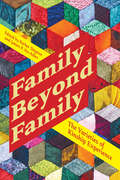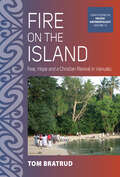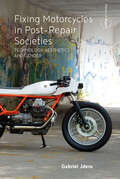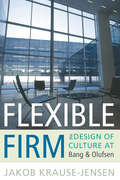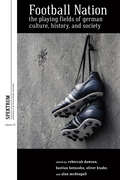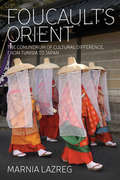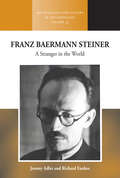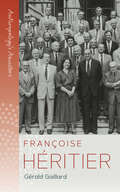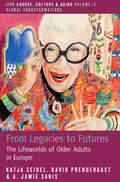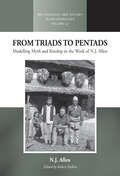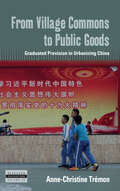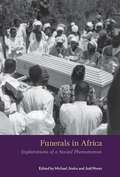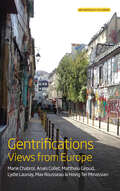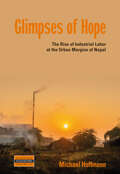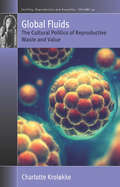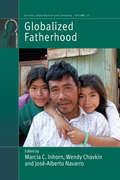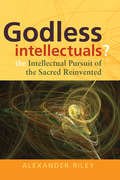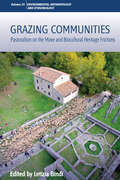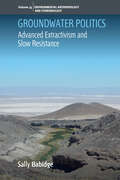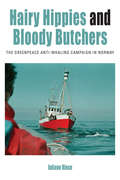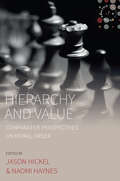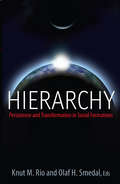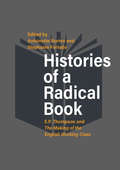- Table View
- List View
Family Beyond Family: The Varieties of Kinship Experience
by Parker Shipton and James P. Ito-AdlerArguably all humans invent or accept forms of family beyond those that are close biological kin. These fictive forms of kinship may vary across diverse cultures and serve different purposes. This book explores a wide variety of such kinship-forming, from expedient daylong pseudo-marriages to notions of deities as everlasting parents for humankind and life on earth. These range from the purely abstract to the bricks and mortar of college fraternities and sororities. Family Beyond Family observes and examines the principles and purposes of such fabricated connections.
Fire on the Island: Fear, Hope and a Christian Revival in Vanuatu (ASAO Studies in Pacific Anthropology #13)
by Tom BratrudIn 2014, the island of Ahamb in Vanuatu became the scene of a startling Christian revival movement led by thirty children with ‘spiritual vision’. However, it ended dramatically when two men believed to be sorcerers and responsible for much of the society’s problems were hung by persons fearing for the island’s future security. Based on twenty months of ethnographic fieldwork on Ahamb between 2010 and 2017, this book investigates how upheavals like the Ahamb revival can emerge to address and sometimes resolve social problems, but also carry risks of exacerbating the same problems they arise to address.
Fire on the Island: Fear, Hope and a Christian Revival in Vanuatu (ASAO Studies in Pacific Anthropology)
by Tom BratrudIn 2014, the island of Ahamb in Vanuatu became the scene of a startling Christian revival movement led by thirty children with ‘spiritual vision’. However, it ended dramatically when two men believed to be sorcerers and responsible for much of the society’s problems were hung by persons fearing for the island’s future security. Based on twenty months of ethnographic fieldwork on Ahamb between 2010 and 2017, this book investigates how upheavals like the Ahamb revival can emerge to address and sometimes resolve social problems, but also carry risks of exacerbating the same problems they arise to address.
Fixing Motorcycles in Post-Repair Societies: Technology, Aesthetics and Gender (Politics of Repair #3)
by Gabriel JderuMost social science studies on automobility have focused on the production, usage, identity construction and aesthetic improvements of personal means of transportation. What happens if we shift the focus to the labour, knowledge and social relations that go into the unavoidable moments of maintenance and repair? Taking motorcycling in Romania as an ethnographic entry point, this book documents how bikers handle the inevitable moments of malfunction and breakdown. Using both mobile and sedentary research methods, the book describes the joys and troubles experienced by amateur mechanics, professional mechanics and untechnical men and women when fixing bikes.
Flexible Firm: The Design of Culture at Bang & Olufsen
by Jakob Krause-JensenBang & Olufsen, the famous Danish producer of high-end home electronics, is well known as an early exponent of value-based management: the idea that there should be consistency in what the organisation does, a certain continuity between what the company develops and sells, and the beliefs and practices of the employees. This study investigates how company values are communicated and the collective identity is articulated through the use of such concepts as 'culture', 'fundamental values', and 'corporate religion', as well as how employees negotiate these ideas in their daily working lives. As this book reveals, the identification of values, meant to create cohesion and solidarity among employees, came to symbolise and engender a split between the staff and the other parts of the company. By examining the rise and fall of the value-based management approach, this volume offers the indispensible insight of anthropological enquiry to expose how social realities challenge conventional management strategies and therefore must be considered in the development of new management techniques.
Football Nation: The Playing Fields of German Culture, History, and Society (Spektrum: Publications of the German Studies Association #25)
by Alan McDougall Rebeccah Dawson, Bastian Heinsohn, Oliver KnabeOver the past century, the impact of football on Germany has been manifold, influencing the arts, political debates, and even contributing to the construction of cultural memories and national narratives. Football Nation analyses the game’s fluid role in shaping and reflecting German society, and spans its focus on modern German history, from the Wilhelmine era to the early 21st century. Expounding on topics of gender, class, fandom, spectatorship, antisemitism, nationalism, and internationalism, a diverse group of interdisciplinary scholars offer a novel approach to understanding the many influences of football throughout its extensive history which until recently has only been available to a German-speaking readership.
Foucault's Orient: The Conundrum of Cultural Difference, From Tunisia to Japan
by Marnia LazregFoucault lived in Tunisia for two years and travelled to Japan and Iran more than once. Yet throughout his critical scholarship, he insisted that the cultures of the "Orient" constitute the "limit" of Western rationality. Using archival research supplemented by interviews with key scholars in Tunisia, Japan and France, this book examines the philosophical sources, evolution as well as contradictions of Foucault's experience with non-Western cultures. Beyond tracing Foucault's journey into the world of otherness, the book reveals the personal, political as well as methodological effects of a radical conception of cultural difference that extolled the local over the cosmopolitan.
Franz Baermann Steiner: A Stranger in the World (Methodology & History in Anthropology #42)
by Jeremy Adler Richard FardonFranz Baermann Steiner (1909-52) provided the vital link between the intellectual culture of central Europe and the Oxford Institute of Anthropology in its post-Second World War years. This book demonstrates his quiet influence within anthropology, which has extended from Mary Douglas to David Graeber, and how his remarkable poetry reflected profoundly on the slavery and murder of the Shoah, an event which he escaped from. Steiner’s concerns including inter-disciplinarity, genre, refugees and exile, colonialism and violence, and the sources of European anthropology speak to contemporary concerns more directly now than at any time since his early death.
Françoise Héritier (Anthropology's Ancestors #3)
by Gérald GaillardFollows the life of French anthropologist Françoise Héritier, who had a lasting impact on a generation of French anthropologists that continues to this day. A great intellectual figure, Françoise Héritier succeeded Claude Lévi-Strauss as the Chair of Anthropology at the Collège de France in 1982. She was an Africanist, author of magnificent works on the Samo population, the scientific progenitor of kinship studies, the creator of a theoretical base to feminist thought and an activist for many causes. “I read this intellectual biography of Françoise Héritier with great pleasure. Though highly regarded in France, she is not yet well known in English-language academic circles, but she certainly should be. This book will be a revelation to many anthropologists and feminist scholars.”—Adam Kuper, London School of Economics From the Forword by Michelle Perrot: I came to know her at the National Council for HIV, that she chaired from 1989 to 1994…. Her theoretical concerns were also crucial to the understanding of pandemics, but we did not then realise that HIV/AIDS was also a precursor and a warning of pandemics to come. She grasped the importance of conceptions of bodily ‘humours’—blood, semen, milk—that seemed to play a role in the horrific spread of an epidemic of which we knew nothing, except that it resulted in an appalling mortality rate, particularly among young men…. she was a remarkable chair, concerned to share her insights into the illness and to anchor—necessary—interventions within a framework that would be respectful of human rights.
From Legacies to Futures: The Lifeworlds of Older Adults in Europe (Life Course, Culture and Aging: Global Transformations)
by A. Jamie Saris Katja Seidel David PrendergastOlder adults want to exercise a sense of control over their relationships, structures and surroundings as they navigate the later life course. Through detailed ethnographic case studies, this book examines the dynamic lifeworlds of a hundred and seven community-dwelling older adults in Europe before and during the COVID-19 pandemic. It explores the importance of agency, the frictions between self-perceptions of age and outside impositions and the need to deconstruct old age as a homogenising category. These insights challenge simple narratives of older persons as social burdens by highlighting the complex roles they fill in family, neighbourhood and communities.
From Triads to Pentads: Modelling Myth and Kinship in the Work of N.J. Allen (Methodology & History in Anthropology)
by N. J. Allen Robert ParkinN.J. (‘Nick’) Allen had an extensive academic career, which for the most part was spent in Oxford. He passed away in 2020. This edited volume brings together a selection of his anthropological papers. They cover two major fields and a supplementary one: Indo-European mythical comparison and his own notion of tetradic kinship, supplemented by a long-term interest in the work of Marcel Mauss and his uncle Émile Durkheim.It follows key areas of his research in which his contributions were novel, innovative, stimulating and plausible.
From Village Commons to Public Goods: Graduated Provision in Urbanizing China (Dislocations #34)
by Anne-Christine TrémonIlluminating the complex processes of China’s uneven urbanization through the lens of the transition from village commons to public goods, this book is set in three urbanized villages in Shenzhen, Chengdu, and Xi’an, which have experienced similar demographic explosions and dramatic changes to their landscapes, the livelihoods of its inhabitants, and the power structures governing their residents. Graduated provision is the delivery of public goods informed by the teleological ideology of urbanization, and by neoliberalism with Chinese characteristics, and has been employed as an answer to the challenges of making public goods, such as welfare provisions, public parks, education, and senior care, equally accessible to all in recently urbanized communities.
Funerals In Africa
by Joel Noret Michael JindraAcross Africa, funerals and events remembering the dead have become larger and even more numerous over the years. Whereas in the West death is normally a private and family affair, in Africa funerals are often the central life cycle event, unparalleled in cost and importance, for which families harness vast amounts of resources to host lavish events for multitudes of people with ramifications well beyond the event. Though officials may try to regulate them, the popularity of these events often makes such efforts fruitless, and the elites themselves spend tremendously on funerals. This volume brings together scholars who have conducted research on funerary events across sub-Saharan Africa. The contributions offer an in-depth understanding of the broad changes and underlying causes in African societies over the years, such as changes in religious beliefs, social structure, urbanization, and technological changes and health.
Gentrifications: Views from Europe (Anthropology of Europe #7)
by Lydie Launay Marie Chabrol Anaïs Collet Matthieu GiroudOffering an original discussion of the gentrification phenomenon in Europe, this book provides new theoretical insights into classical works on the subject. Using a thorough analysis of the diversity of the forms, places and actors of gentrification in an attempt to isolate its ‘DNA’, the book addresses the place of social groups in cities, their competition over the appropriation of space, the infrastructure unequally offered to them by economic and political actors and the stakes of everyday social relationships.
Glimpses of Hope: The Rise of Industrial Labor at the Urban Margins of Nepal (Dislocations #32)
by Michael HoffmannOver the last decade, Nepal has witnessed significant urban growth and an expanding urban middle class. Glimpses of Hope tells the story of the people who enable some of the middle-class consumer practices in urban Nepal. The book focuses on workers in areas such as modern food-processing, water-bottling, housebuilding, and sand-mining industries and explores how workers see such forms of work, where union organization can help, and how work opportunities emerge along lines of gender and ethnicity. Although global labor relations have been mostly in decline for decades, this ethnography offers insights and glimpses of hope in terms of labor dynamics and the opportunities various jobs may afford.
Global Fluids: The Cultural Politics of Reproductive Waste and Value (Fertility, Reproduction and Sexuality: Social and Cultural Perspectives #39)
by Charlotte KroløkkeIn the fertility and cosmetics industries, women’s body products – such as urine, eggs, and placentas – have moved from being seen as waste to becoming valuable ingredients. Taking a sociological and anthropological perspective, the author focuses in particular on the role that countries like Denmark, Spain, the Netherlands, and Japan play in the reproductive products industry, and discusses the moral limits of the cultural and rhetorical trajectories that turn women’s body products into internationally mobile substances.
Globalized Fatherhood
by Marcia C. Inhorn José-Alberto Navarro Wendy ChavkinUsing an entirely new conceptual vocabulary through which to understand men's experiences and expectations at the dawn of the twenty-first century, this path-breaking volume focuses on fatherhood around the globe, including transformations in fathering, fatherhood, and family life. It includes new work by anthropologists, sociologists, and cultural geographers, working in settings from Peru to India to Vietnam. Each chapter suggests that men are responding to globalization as fathers in creative and unprecedented ways, not only in the West, but also in numerous global locations.
Godless Intellectuals?: The Intellectual Pursuit of the Sacred Reinvented (Berghahn Ser.)
by Alexander Tristan RileyThe Durkheimians have traditionally been understood as positivist, secular thinkers, fully within the Enlightenment project of limitless reason and progress. In a radical revision of this view, this book persuasively argues that the core members of the Durkheimian circle (Durkheim himself, Marcel Mauss, Henri Hubert and Robert Hertz) are significantly more complicated than this. Through his extensive analysis of large volumes of correspondence as well as historical and macro-sociological mappings of the intellectual and social worlds in which the Durkheimian project emerged, the author shows the Durkheimian project to have constituted a quasi-religious quest in ways much deeper than most interpreters have thought. Their fascination, both personal and intellectual, with the sacred is the basis on which the author reconstructs some important components of modern French intellectual history, connecting Durkheimian thought to key representatives of French poststructuralism and postmodernism: Bataille, Foucault, Derrida, Baudrillard, and Deleuze.
Grazing Communities: Pastoralism on the Move and Biocultural Heritage Frictions (Environmental Anthropology and Ethnobiology #29)
by Letizia BindiPastoralism is a diffused and ancient form of human subsistence and probably one of the most studied by anthropologists at the crossroads between continuities and transformations. The present critical discourse on sustainable and responsible development implies a change of practices, a huge socio-economic transformation, and the return of new shepherds and herders in different European regions. Transhumance and extensive breeding are revitalized as a potential resource for inner and rural areas of Europe against depopulation and as an efficient form of farming deeply influencing landscape and functioning as a perfect eco-system service. This book is an occasion to reconsider grazing communities’ frictions in the new global heritage scenario.
Groundwater Politics: Advanced Extractivism and Slow Resistance (Environmental Anthropology and Ethnobiology)
by Sally BabidgeThe mining industry is an expanding socio-ecological and political problem worldwide, not least in Atacameño-Likanantay (Indigenous) territories in the hyper-arid Salar de Atacama, Chile. Groundwater Politics addresses the social, technical and political conditions it calls ‘advanced extractivism’ to reveal how groundwater extraction sustains both ecological damage and mining economies. It richly describes the area's copper and lithium industries as historically linked with Indigenous communities and their ecological and economic futures. Based on over a decade of ethnographic research, the book casts community strategies to control water and territory as 'slow resistance’, the structural and multifaceted practices that generate a material future amid potential resource exhaustion.
Hairy Hippies and Bloody Butchers: The Greenpeace Anti-Whaling Campaign in Norway
by Juliane RieseIn the popular imagination, no issue has been more closely linked with the environmental group Greenpeace than whaling. Opposition to commercial whaling has inspired many of the organization's most dramatic and high-profile "direct actions"-as well as some of its most notable failures. This book provides an inside look at one such instance: Greenpeace's decades-long campaign against the Norwegian whaling industry. Combining historical narrative with systems-theory analysis, author Juliane Riese shows how the organization's self-presentation as a David pitted against whale-butchering Goliaths was turned on its head. She recounts how opponents successfully discredited the campaign while Greenpeace struggled with internal disagreements and other organizational challenges, providing valuable lessons for other protest movements.
Haunting Futures: Crisis, Migration and Anticipation in Iceland (New Anthropologies of Europe: Perspectives and Provocations #10)
by Marek PawlakThe 2008 economic collapse in Iceland sent its residents into a destabilising crisis with far-reaching, temporal and affective consequences. Haunting Futures explores how the complex relationships of this unstable past and the anticipatory modes of the ongoing present keep Icelanders and the Polish migrant community in their midst alert to looming futures in crisis. It offers insights into timely crisis-ridden impacts and imaginings, migration processes and social understandings and practices. Through its attention to how people engage with crisis temporally and affectively, the book presents the crisis not simply as an isolated and distressing event but as a spectre embodied in time through ongoing anticipation.
Hierarchy and Value: Comparative Perspectives on Moral Order (Studies in Social Analysis #7)
by Jason Hickel Naomi HaynesGlobalization promised to bring about a golden age of liberal individualism, breaking down hierarchies of kinship, caste, and gender around the world and freeing people to express their true, authentic agency. But in some places globalization has spurred the emergence of new forms of hierarchy—or the reemergence of old forms—as people try to reconstitute an imagined past of stable moral order. This is evident from the Islamic revival in the Middle East to visions of the 1950s family among conservatives in the United States. Why does this happen and how do we make sense of this phenomenon? Why do some communities see hierarchy as desireable? In this book, leading anthropologists draw on insightful ethnographic case studies from around the world to address these trends. Together, they develop a theory of hierarchy that treats it both as a relational form and a framework for organizing ideas about the social good.
Hierarchy: Persistence and Transformation in Social Formations
by Olaf H. Smedal Knut M. RioLouis Dumont's concept of hierarchy continues to inspire social scientists. Using it as their starting point, the contributors to this volume introduce both fresh empirical material and new theoretical considerations. On the basis of diverse ethnographic contexts in Oceania, Asia, and the Middle East they challenge some current conceptions of hierarchical formations and reassess former debates - of post-colonial and neo-colonial agendas, ideas of "democratization" and "globalization," and expanding market economies - both with regard to new theoretical issues and the new world situation.
Histories of a Radical Book: E. P. Thompson and <em>The Making of the English Working Class</em>
by Antoinette Burton and Stephanie FortadoFor better or worse, E.P. Thompson’s monumental book The Making of the English Working Class has played an essential role in shaping the intellectual lives of generations of readers since its original publication in 1963. This collected volume explores the complex impact of Thompson’s book, both as an intellectual project and material object, relating it to the social and cultural history of the book form itself—an enduring artifact of English history.
